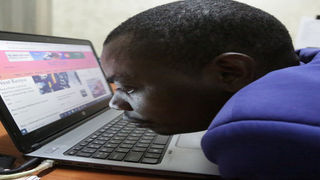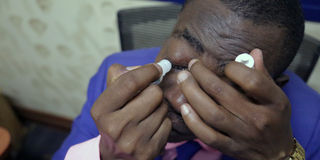
Gibo Zachary reads the Nation.Africa website platform during an interview at Nation offices in Kisii on January 11, 2022. The partially blind sports journalist is also a lawyer and lecturer at the Kisii University.
| Ondari Ogega | Nation Media GroupKisii
Premium
How man beat blindness to study law, journalism
The events of February 2000 are still fresh in the mind of Zachary Bori Gisiri, alias Gibo Zachary.
Gibo, 40, a lawyer and a passionate sports journalist, went down with malaria-like symptoms.
He took three Fansidar tablets, making up a single dose recommended for treating malaria at the time.
The drugs were prescribed over the counter but the use of the anti-malarial drug had drastically reduced.
The drug triggered a reaction in Gibo’s body, leading to abnormal sweating and complete loss of strength.
Sulfadoxine and pyrimethamine, sold under the brand name Fansidar, is a combination medication used to treat malaria.
The side effects include diarrhoea, rash itchiness, headache and loss of hair.
A severe allergic reaction or rash such as toxic epidermal necrolysis may occur.
It is not recommended in people with a sulfonamide allergy or significant liver or kidney disease.
Though doctors could reverse the effects of the drug, general ignorance and lack of proper medical attention due to his poor background led to a near-fatal result for Gibo.
"Many things were said when I got sick. Some said I was bewitched because I was a bright student. Everyone came up with his version of the story about me,” he said.
Gibo was born in Komomange village in Kuria West constituency to Mzee Paul Gisiri Gati and Mama Janes Nyakoboke Arasa Bori. He is the last-born in a family of 15.
He started school at an advanced age and became a Form One student at Father Angel Secondary School in Kehancha, Kuria, when he was 17 years old.
He was a day scholar, loved school and worked hard. After his first examination in secondary school, he got a mean grade of A.
Strong and moving
"I became sick after this exam and things turned upside down, changing my life completely. But resilience, determination and sheer will to be who I want to be in life have kept me strong and moving," Gibo said.
What started as a minor problem, he said, led to a life-threatening situation that saw him hospitalised for about six months.
"On the night I fell sick, I longed for morning to arrive so that I could go to a hospital. But when I woke up, I encouraged myself that I should not miss school, though I struggled a lot to reach there.
“But my condition worsened and a teacher and one of my fellow students took me to Kehancha Hospital for treatment.”
On his way to the hospital, the sportswriter noticed that his vision had become blurred. He was straining to see and immediately after registering at the hospital, he was admitted.

Gibo Zachary uses artificial tears during an interview at Nation offices in Kisii on January 11, 2022. The partially blind sports journalist is also a lawyer and lecturer at the Kisii University.
After some time in the hospital, he lost his sight completely. His body started to appear rotten and his skin started to peel off.
He could not wear any clothes and was always covered with a wet fabric. Any dry fabric would stick to his body and removing it meant peeling off the skin.
“My body had a foul smell and I was in pain. It was anguish and untold suffering for me, but my parents remained with me in my hospital bed.”
After several months of unsuccessful treatment, he said, a miracle happened one day and he suddenly felt his body regain strength.
His skin started healing, though slowly. But he could not see. He said this situation left him in self-denial.
He could not imagine that he was now blind and started locking himself in his hut and did not allow anybody to see him.
“My parents struggled to comfort me and even wanted to get me a wife to take care of me but I refused, because no woman would accept to marry a wretched and helpless 18-old-boy and remain with me for the rest of my miserable life.”
After four years of desperation at home waiting for what fate would bring forth, one day, his mother, who sold vegetables in Kehancha, was informed that a group in that town helped people with physical challenges.
“The following morning, my mother visited the social services office and found Ms Regina Maina, who introduced her to a Mr Jeremiah, the person in charge of special education.
“The duo agreed to visit our home. True to their word, they came, assessed me and told my parents that there are schools for the blind and I should go. This renewed my hopes, though I was still in denial.”
In 2004, he was taken to Machakos Technical Institute for the Blind to study Braille. While there, he met Mr Dennis Onyango, who had lost his sight after an accident while painting.
Admitted to university
“Dennis was jovial and had known all places in Machakos town though he was totally blind. This really changed my perception and made me accept myself and it was the turning point to the positive and determined me today.”
He started to regain his vision partially in 2005. At this time, he joined Thika School for the Blind and sat his KCSE after four years of study. He excelled and was admitted to university.
Before the KCSE results were released, he had requested his father to send him for a diploma course in journalism at St Ann's College in Kisii.
His father agreed to pay for the course and he joined the college in January 2009. By the time he was finishing in June 2010, he received his admission letter to study law at the University of Nairobi.
But because he was living in Kisii and was closer to his home in Kuria, he decided to seek an inter-university transfer to Kisii University.
“This fulfilled my dreams because, from childhood, I wanted to be a journalist. My role model is Mr Jack Oyoo Sylvester.
“I also wanted to be a lawyer. I thank God I have become both. I am now a sportswriter and a law lecturer at Kisii University, teaching law school and media law for media students.
Gibo is in his second year studying for a master’s degree in law. He plans to join the Kenya School of Law’s advocate training programme, a requirement before he can practise as an advocate.
Before the 2000 ordeal that left him blind, he used to be a great footballer and a short-distance runner. But after partially regaining his sight, he decided to start writing about sports as a way to quench his undying love for sports.
“Sports journalism is a passion and I also play football and other sports.”
He said he remains focused and that he does not see his impaired vision as an obstacle.
“I have conquered and achieved a lot so far and I am even more determined to scale more heights. Despite my suffering in my teenage and youthful years, I vowed not to be a beggar and a burden to anyone.
“I told myself that I was capable and could be who I wanted to be. I psyched myself up, and here I am.”
He said he lives with a positive attitude, and now his family, friends and relatives look up to him for support.





